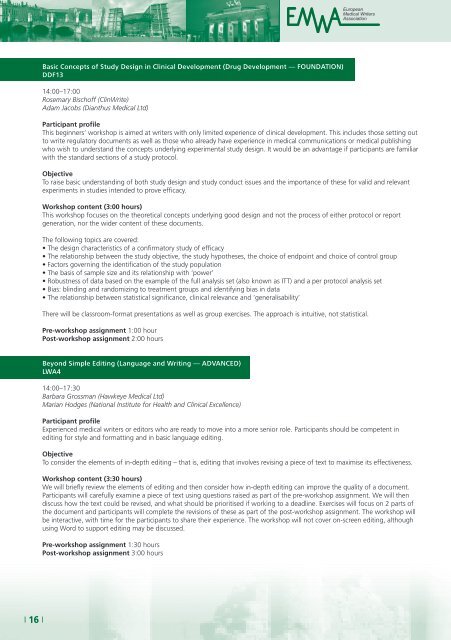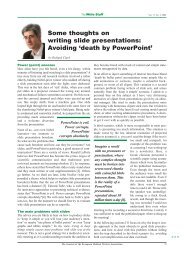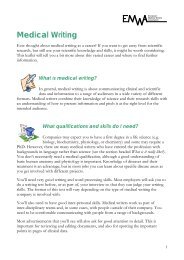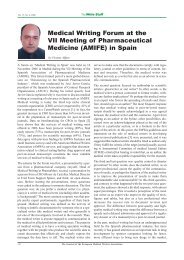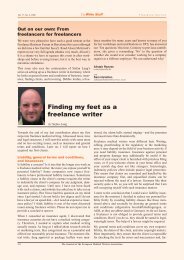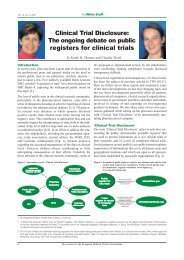Download Conference Brochure - EMWA
Download Conference Brochure - EMWA
Download Conference Brochure - EMWA
Create successful ePaper yourself
Turn your PDF publications into a flip-book with our unique Google optimized e-Paper software.
| 16 |<br />
Basic Concepts of Study Design in Clinical Development (Drug Development — FOUNDATION)<br />
DDF13<br />
14:00–17:00<br />
Rosemary Bischoff (ClinWrite)<br />
Adam Jacobs (Dianthus Medical Ltd)<br />
Participant profile<br />
This beginners’ workshop is aimed at writers with only limited experience of clinical development . This includes those setting out<br />
to write regulatory documents as well as those who already have experience in medical communications or medical publishing<br />
who wish to understand the concepts underlying experimental study design . It would be an advantage if participants are familiar<br />
with the standard sections of a study protocol .<br />
Objective<br />
To raise basic understanding of both study design and study conduct issues and the importance of these for valid and relevant<br />
experiments in studies intended to prove efficacy .<br />
Workshop content (3:00 hours)<br />
This workshop focuses on the theoretical concepts underlying good design and not the process of either protocol or report<br />
generation, nor the wider content of these documents .<br />
The following topics are covered:<br />
• The design characteristics of a confirmatory study of efficacy<br />
• The relationship between the study objective, the study hypotheses, the choice of endpoint and choice of control group<br />
• Factors governing the identification of the study population<br />
• The basis of sample size and its relationship with ‘power’<br />
• Robustness of data based on the example of the full analysis set (also known as ITT) and a per protocol analysis set<br />
• Bias: blinding and randomizing to treatment groups and identifying bias in data<br />
• The relationship between statistical significance, clinical relevance and ‘generalisability’<br />
There will be classroom-format presentations as well as group exercises . The approach is intuitive, not statistical .<br />
Pre-workshop assignment 1:00 hour<br />
Post-workshop assignment 2:00 hours<br />
Beyond Simple Editing (Language and Writing — ADVANCED)<br />
LWA4<br />
14:00–17:30<br />
Barbara Grossman (Hawkeye Medical Ltd)<br />
Marian Hodges (National Institute for Health and Clinical Excellence)<br />
Participant profile<br />
Experienced medical writers or editors who are ready to move into a more senior role . Participants should be competent in<br />
editing for style and formatting and in basic language editing .<br />
Objective<br />
To consider the elements of in-depth editing – that is, editing that involves revising a piece of text to maximise its effectiveness .<br />
Workshop content (3:30 hours)<br />
We will briefly review the elements of editing and then consider how in-depth editing can improve the quality of a document .<br />
Participants will carefully examine a piece of text using questions raised as part of the pre-workshop assignment . We will then<br />
discuss how the text could be revised, and what should be prioritised if working to a deadline . Exercises will focus on 2 parts of<br />
the document and participants will complete the revisions of these as part of the post-workshop assignment . The workshop will<br />
be interactive, with time for the participants to share their experience . The workshop will not cover on-screen editing, although<br />
using Word to support editing may be discussed .<br />
Pre-workshop assignment 1:30 hours<br />
Post-workshop assignment 3:00 hours


